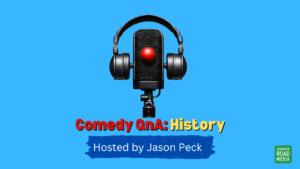I read an article on Chortle, the British comedy website, recently which spoke about the incident where comedian Lee Hurst smashed the mobile phone of an audience member who was filming his act. This is useful to read about if you’re a comedian or if you’re delivering funny presentations.
Hurst, like a lot of comedians, didn’t want his material to be stolen and/or potentially uploaded to YouTube.
As author Dave Cohen points out, it’s one of those age old questions; “how do I stop my gags being stolen?” Well, it’s extremely difficult to copyright a joke. Perhaps one way to do it is to become so successful you no longer care and people would recognise your material instantly if it was used by someone else.
I can’t imagine someone giving a funny presentation and trying to pass off the material of Ross Noble or Eddie Izzard as their own. Their material is too distinctive and contains a large amount of improvisation.
The Comedy Ether
Sometimes people create material simultaneously and there is no stealing of jokes at all. I remember when I was around 15 or 16 I when I began writing down the funny thoughts that came into my head, I was working on a small stand-up bit about supermarkets. Not the world’s most original topic, but as I’ve said before it’s often what you do with the topic.
It seemed that parents always took their children to supermarkets to let them cry. I was proud of my little observation and I was in the process of refining it when I happened to watch Dave Allen’s show. I sat there mouth open-wide as he began to make an almost identical observation. I had never seen the piece before, so there was no way that I could’ve been subconsciously influenced by him. This was also before I was performing so there’s no way he could’ve seen me either.
But there he was on TV delivering “my bit”. Obviously, I shelved the piece because if I was to do it, people would’ve thought I’d stolen it from Dave Allen. It seems as though we both reached into the comedy collectiveness and pulled out the same idea.
Old School Views
The problem can come from a certain breed of comedian of the old school, who used to frequently exchange material. But it seems that the majority of whom I had seen were using jokes. As I’ve said before these have no author they just seem to get passed around via word of mouth or the internet and get re-jigged slightly in the process. They’re also perfectly acceptable to tell if you’re giving a funny presentation.
The danger is that some of the older school comedians aren’t satisfied with using street jokes, or joke stories. They see a new school comedian perform and decide that their material is better than some of the street jokes and decide to yoink what they see. It’s one thing adapting street jokes for your own use, but it’s another thing entirely stealing another comedian’s act and passing it off as your own.
As Dave Cohen says in his article comedy isn’t just about ideas, it’s also about execution and he’s absolutely right. That’s why the comedy thieves would have a hard time stealing material from the likes of Noble or Izzard as their ideas are delivered in their own comedy rhythms which helps make it distinctive to them.
Spoken comedy is more than just the ideas and funny lines, it’s about the person delivering it and the way it gets delivered. This is true whether you’re delivering a stand-up comedy act in a club or if you’re a humorist delivering a funny presentation.
As Cohen points out, many comedians can take 2 to 3 years developing 20 minutes, unless they work towards Edinburgh on an annual basis, in which case they develop and hour during the course of a year.
It seems that because material can take this long to develop that the animosity can set in if jokes get stolen. If you are writing jokes in isolation one at a time I would get pissed off if they got stolen too.
The Copyright Solution?
Whilst you cannot copyright a joke, I think what would you could do is put your material into a script format so that it reads like a one-person play. A play can be copyrighted. If you’re a comedian or someone who gives funny presentations here’s something you could use:
Darkness.
A bare stage, with a microphone centre stage.
The lights come up as introductory music plays and a comedian enters.
He grabs the microphone and surveys the room.
COMEDIAN: Opening line. Material, material, material.
Note: I have indented this bit for ease of reading.
You would go on to write out your act including any physical bits of business too. Once you have converted your material into a play, it can be sent off to the Writer’s Guild of America that have thousands of scripts sent to them every year for copyrighting purposes.
If you add or delete material then you would have to go through this process again as the “play” would have changed. So it’s best to wait until you have an act that rocks, before you register it.
A cheaper way to do this is to put in in an envelope and send it to yourself via recorded delivery. That way it gets stamped and the post office have a record of it. I would recommend labelling the envelope so you know the contents and sign the part of the envelope where you seal it down.
Potential You Tube Benefits
Another way to look at it is that you should allow people to video your act and out it on You Tube. This is what happened to the comedian Russell Peters. Clips of one of his early specials was uploaded to You Tube and became massively popular. Here’s an extract from Peters’ site where an article in a 2006 edition of “Variety” explains how popular:
“Canadian native Peters doesn’t see eye to eye with the MPAA on this whole piracy issue. For 17 long years he’s been toiling as a standup, slowly building a fan base in his native country. But it wasn’t until someone dumped his 45-minute “Comedy Now!” show on the Internet last year that Peters realized his worldwide potential.
“I don’t have any idea who did it, but I certainly would like to take them out for a nice deli sandwich,” says Peters, who has made frequent stops in Montreal for Just For Laughs in recent years.
Though Peters has yet to release his first major album, he’s still able to fill big arenas in far-off destinations — selling out 10,000 Australian seats in 48 hours for a recent Down Under tour is testament to that.”
So it’s possible to go that route. Allow your act to be videoed and hope someone will upload it to YouTube and hope that you’re good enough to develop a following like Peters did.
Dane Cook did something similar. To my knowledge he invested loads of money into a website, whilst building his fanbase, and provided audio clips of his act which fans would then send to their friends. I don’t think he allowed them to be downloaded though.
Solution: Create Bulk Material?
Personally, I try to develop my material in bulk. I create a block of humour, or a routine, right off the bat and if I’m performing regularly it doesn’t take it long to get it killing audiences. If it doesn’t I pitch it and create something else. If you can create chunks of material rather than one line after another, then it can reduce the amount of stress that we experience if we’re constantly concerned our funny might get stolen.
I am also less concerned these days because I tend do more funny presentations than pure stand-up. It’s just the way things have evolved for me and it suits me better. I prefer the hours and the audiences are different.
If someone’s videoing your act, have a chat with them during the show or afterwards preferably and try to determine what they’re planning to do with the clip. It may end up working in your favour. This is more likely to happen in a comedy club, than if you are delivering a funny presentation.
Yes it’s annoying if jokes gets stolen, but if you can churn out material regularly it shouldn’t matter to you. Video phones and You Tube aren’t going to go away (you’ll probably laughing if you’re reading this at a point in time when it has all gone away). I think it’s best if we can accept that these new media are there and try to hijack them ourselves and use them to our best advantage.
Note: There are affiliate links in this post. That means if you purchase a product via my link I get paid a commission. This one of the ways I can pay the bills. Please don’t feel obliged to do so.



